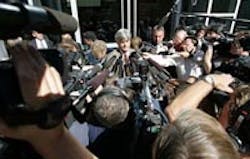Ressam Gets 22 Years for Plot to Bomb U.S. Airport on Eve of Millennium
SEATTLE (CP) -- A U.S. judge handed a 22-year prison term Wednesday to Ahmed Ressam, the millennium bomb plotter who was caught with a trunkful of explosives as he tried to sneak into the United States from Canada in 1999.
Ressam, 38, an Algerian who once lived in Montreal, sat stoically as Judge John Coughenour handed down the sentence in U.S. District Court in Seattle.
But just before he was sentenced, Ressam, 38, sent a note to the judge. It was not read out in court but defence lawyer Thomas Hillier told reporters outside that Ressam said in the note that he's sorry for what he had done and has now renounced terrorism.
Ressam was arrested in Port Angeles, Wash., in December 1999 after taking a ferry across Juan de Fuca Strait from Victoria. He was later convicted of plotting to bomb the Los Angeles International Airport on the eve of the millennium.
In passing sentence, the judge said he hoped to balance U.S. resolve to punish potential terrorist acts with Ressam's co-operation, while reflecting the government's pretrial offer of 25 years.
Coughenour also said the U.S. court system works in dealing with terrorism cases.
''We did not need to use a secret military tribunal, detain the defendant indefinitely or deny the defendant the right to counsel ... our courts have not abandoned the commitment to the ideals that set this nation apart,'' the judge said in court.
The 22-year sentence includes the 5½ years Ressam has spent in custody. Good behaviour in prison could bring a further reduction of three years, meaning his sentence might be completed in about 14 years, Hillier said.
Wearing a long blue shirt that he didn't tuck in, Ressam sat at a desk on one side of the courtroom, in the middle of his lawyers and an interpreter. He showed no emotion when the sentence was read.
Hillier said later that Ressam is ''a stoic man'' and probably would have had the same reaction if the sentence had been different.
In his pre-sentence submission, Hillier described Ressam as a ''remarkable and courageous man'' who came to the United States to ''do something terribly wrong, and he has changed.''
Hillier and U.S. Attorney John McKay disagreed on the level of co-operation that Ressam had given authorities.
Hillier portrayed the information Ressam provided during interrogation as invaluable in increasing the knowlege of U.S. authorities about terrorism. ''Public safety has benefitted in immeasuable ways due to his co-operation,'' the defence lawyer said.
But McKay, in court filings and his presentation Wednesday, suggested that Ressam's decision to stop co-operating since 2003 could result in the U.S. government having to stay extradition proceedings against two other suspects. Samir Ait Mohamed has been held in Vancouver since his arrest in 2001 and Haydar Abu Doha is jailed in Britain. Both are wanted by the United States.
U.S. authorities had hoped to acquire more information about them from Ressam but he has refused.
''The government expects it will have to dismiss both the pending terrorism cases against Abu Doha and Samir Mohamed and may have to withdraw the extradition request to the United Kingdom and Canada,'' the government said in a court filing.
Ressam's sentencing came after a three-month adjournment. Coughenour surprised lawyers for the defence and Justice Department in April by ordering the delay to give Ressam more time to reconsider testifying against Mohamed and Doha.
Ressam was convicted in 2001 on nine counts, including explosives and terrorist conspiracy charges, and he faced as much as 130 years in prison.
His sentencing was delayed several times because he had originally agreed to co-operate with authorities in return for a lighter sentence.
Prosecutors said Ressam has provided information on more than 100 potential terrorists in interviews that stretched over two years.
But in an April court filing, prosecutors said they recommended a longer sentence because Ressam had stopped co-operating in 2003, ''breaching his agreement and effectively terminating at least two criminal cases of vital interest to national security.''
During the time he co-operated, Ressam covered topics on training camps in Afghanistan, terrorist recruitment, training, cell locations, targets, the making of explosives and ideology.
The U.S. government said Ressam's testimony helped convict Mokhtar Haouari of supplying fake identification and cash for the millennium plot. He was sentenced to 24 years in prison.
The defence said Ressam's information had led to the arrests of potential terrorists in the United States, Canada, Italy, Germany and France.
